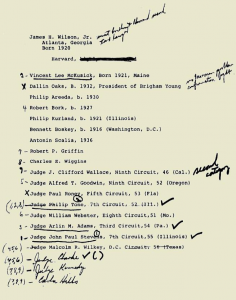 Today, the Senate Majority Leader, Mitch McConnell, announced the unprecedented decision that the United States Senate will refuse to consider any nominee put forward by President Obama during the remainder of his term in office to fill the current vacancy on the United States Supreme Court. Senator McConnell said, “My decision is that I don’t think that we should have a hearing. We should let the next president pick the Supreme Court justice.”
Today, the Senate Majority Leader, Mitch McConnell, announced the unprecedented decision that the United States Senate will refuse to consider any nominee put forward by President Obama during the remainder of his term in office to fill the current vacancy on the United States Supreme Court. Senator McConnell said, “My decision is that I don’t think that we should have a hearing. We should let the next president pick the Supreme Court justice.”
The refusal of the United States Senate to consider any nominee put forth by President Obama is a clear violation of the Appointments Clause of the United States Constitution. Under the Appointments Clause (Article II, Section 2, Clause 2):
The President . . . shall nominate, and by and with the Advice and Consent of the Senate, shall appoint Ambassadors, other public Ministers and Consuls, Judges of the supreme Court, and all other Officers of the United States, whose Appointments are not herein otherwise provided for, and which shall be established by Law. . .
The role of the President is to appoint nominees to the United States Supreme Court. The role of the Senate is to provide their “advice and consent” to the President on the specific nominee.
The meaning is “advice and consent” is clear and uncontroversial. The Framers of the Constitution recognized that absolute monarchs such as the King of England had abused the power to appoint public officials. This abuse was due to the monarch’s absolute power to appoint anyone they chose. In response, the Constitution divided the power to appoint superior public officials and Supreme Court Justices between the Executive (the President) and the Senate. The Framers of the Constitution diffused the appointment power, just as they diffused several other powers among separate branches of the federal government in order to guard against abuse.
However, the separation of the power to appoint into two pieces is not split 50-50 between the President and the Senate. Rather, the split is made between the President’s absolute power to select any nominee he or she chooses, and the Senate’s power to accept or reject the nominee. The intent of the Appointments Clause is to give the Senate a check on the President’s choice, in order to prevent nominations that result from corruption, cronyism, or the advancement of unqualified nominees (i.e., family members). The Appointments Clause does not give the Senate any role in deciding who or when the President will nominate.
In fact, the Senate has no pre-nomination role at all in the appointment process. The Senate’s only role under the Constitution arises after the President makes a nomination. In this regard, it has often been remarked that the power of initiative lies with the President under the Appointments Clause.

